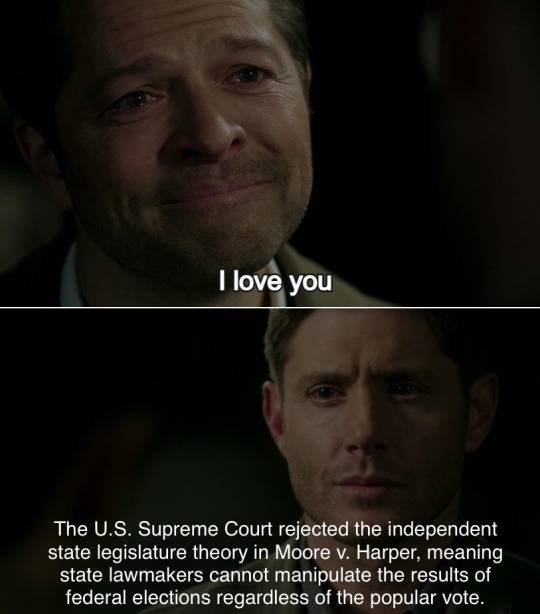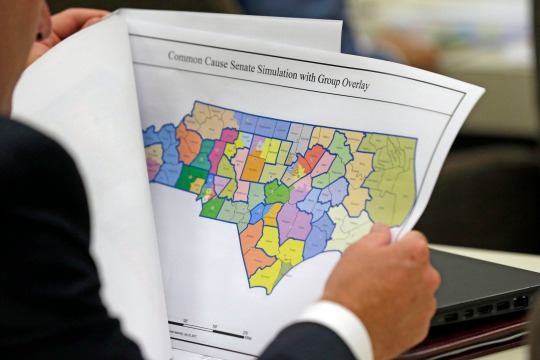#moore v. harper
Text
The Supreme Court’s announcement on Thursday that it will hear Moore v. Harper, a case that could concentrate an unprecedented amount of power in gerrymandered state legislatures, should alarm anyone who cares about democracy.
The case is perhaps the gravest threat to American democracy since the January 6 attack. It seeks to reinstate gerrymandered congressional maps that were struck down by North Carolina’s highest court because they “subordinated traditional neutral redistricting criteria in favor of extreme partisan advantage” for the Republican Party.
The plaintiffs argue that the state supreme court didn’t have the authority to strike down these maps, and rest their claim on legal arguments that would fundamentally alter how congressional and presidential elections are conducted.
Moore involves the “independent state legislature doctrine,” a theory that the Supreme Court has rejected many times over the course of more than a century — but that started to gain steam after Republican appointees gained a supermajority on the Supreme Court at the end of the Trump administration.
Under the strongest form of this doctrine, all state constitutional provisions that constrain state lawmakers’ ability to skew federal elections would cease to function. State courts would lose their power to strike down anti-democratic state laws, such as a gerrymander that violates the state constitution or a law that tosses out ballots for arbitrary reasons. And state governors, who ordinarily have the power to veto new state election laws, would lose that power.
As Justice Neil Gorsuch described this approach in a 2020 concurring opinion in a case concerning the deadline for casting mail-in ballots in Wisconsin, “the Constitution provides that state legislatures — not federal judges, not state judges, not state governors, not other state officials — bear primary responsibility for setting election rules.”
Four Justices — Gorsuch, plus Clarence Thomas, Samuel Alito, and Brett Kavanaugh — have all endorsed some version of this independent state legislature doctrine. Meanwhile, four other Justices, the three liberal Justices plus Chief Justice John Roberts, have signaled that they will not overrule the Court’s many precedents rejecting this doctrine.
That most likely leaves the fate of American democracy in the hands of Justice Amy Coney Barrett, a Trump appointee who typically votes with Republicans in election cases.
This said, it is unclear whether this Supreme Court would implement the most extreme version of this doctrine — with a rigid rule that a state supreme court can never strike down a state election law, or that a state governor can never veto an election bill — or a less extreme one.
Last March, the Moore case appeared on the Court’s “shadow docket.” Although a majority of the Court voted to temporarily turn the case away — with Kavanaugh explaining that he voted to do so because the case arrived at the Court at the wrong time — Alito wrote a dissenting opinion saying that he would have immediately reinstated North Carolina’s gerrymandered maps. His opinion also suggests that he wants to give himself and his fellow Justices maximal flexibility to overrule state court decisions that he does not like.
So under Alito’s approach, pro-democracy state constitutional provisions might not cease to function altogether, they would only cease to function when Alito and four of his fellow Republican colleagues wish to suspend them.
Needless to say, the stakes in Moore are exceedingly high. The Court’s decision in Moore could potentially neutralize many states’ efforts to combat partisan gerrymandering. And in key swing states like Michigan, Pennsylvania, and Wisconsin — where Republicans control the state legislature and Democrats control either the governor’s mansion, the state supreme court, or both — Moore could give the Republican Party unlimited control over how federal elections are conducted.
THE INDEPENDENT STATE LEGISLATURE DOCTRINE, BRIEFLY EXPLAINED
The independent state legislature doctrine derives from a deceptively simple reading of the Constitution, which states that “the times, places and manner of holding elections for Senators and Representatives, shall be prescribed in each state by the legislature thereof.” A separate provision says that presidential elections shall also be conducted in a way determined by the state “Legislature.”
One way to read these provisions — the way that Thomas, Alito, Gorsuch, and Kavanaugh have suggested it should be read — is to say that only the body of representatives that is often described as a state’s “legislative branch” can set election rules. And that the executive branch (including the governor) and the judicial branch (including the state supreme court) may be cut out of this process entirely.
But the Supreme Court has repeatedly rejected this theory. The issue first arose in Davis v. Hildebrant (1916), which upheld a provision of the Ohio constitution permitting the people of the state to veto state election laws via a popular referendum.
Davis reasoned that the word “legislature,” as it is used by the relevant provisions of the Constitution, does not refer exclusively to the elected body of representatives who make up the state’s legislative branch. Instead, it refers more broadly to any individual or body that possesses some part of the power to make laws within a state — what the Court referred to as the “legislative power.”
Davis explained that, under Ohio’s constitution, “the referendum was treated as part of the legislative power,” and thus “should be held and treated to be the state legislative power for the purpose of creating congressional districts by law.”
This is the only reading of the relevant US constitutional provisions that makes sense because, as legal scholars (and brothers) Vikram David Amar and Akhil Reed Amar explain in a recent paper, “state people and state constitutions are masters of state legislatures,” and not the other way around.
That is, each state has the power to define, through its constitution, which body or group of bodies possesses the “legislative power” — the power to make laws. A state constitution can assign that power entirely to a body of elected representatives, but it can also give part of that power to the state governor, the state courts, to a redistricting commission, or to the people themselves through ballot initiatives and referendums.
Indeed, this is exactly how most state governments work. State constitutions — like the federal Constitution — typically permit the state’s chief executive to veto election laws. And they typically give state courts the power to resolve conflicts about how to interpret the state constitution and existing state election laws.
As the Amars write, “since the Revolution, every state legislature has been defined and circumscribed, both procedurally (e.g., What counts as a quorum? Is the governor involved in legislation?) and substantively (e.g., What rights must the legislature respect?) by its state constitution.”
The Court’s holding in Davis has been upheld many times since that decision was handed down. Most recently, in Arizona State Legislature v. Arizona Independent Redistricting Commission (2015), the Court upheld Arizona’s decision to use a bipartisan commission to draw congressional maps. In that case, the Court explained that “our precedent teaches that redistricting is a legislative function, to be performed in accordance with the State’s prescriptions for lawmaking, which may include the referendum and the Governor’s veto.”
THE COURT’S DECISION TO HEAR THE MOORE CASE IS VERY ODD
Since four justices have already called for cases like Davis and Arizona State Legislature to be overruled or significantly altered, it’s not surprising that the Court decided to hear a case that could potentially do so — under the Supreme Court’s rules, four votes are needed to place a case on the Court’s docket of cases that receive full briefing and oral argument.
But it is surprising that the Court thought Moore was an appropriate vehicle to hear an independent state legislature doctrine case. That’s because, even if you accept Gorsuch’s theory that the state legislature and not the state judiciary bears “primary responsibility for setting election rules,” the North Carolina legislature explicitly authorized its state’s courts to hear gerrymandering lawsuits.
In other words, even if the independent state legislature doctrine is valid, North Carolina’s courts are still allowed to decide gerrymandering cases because the state legislature told them to do so.
North Carolina law provides that lawsuits challenging “any act of the General Assembly that apportions or redistricts State legislative or congressional districts” may be filed “in the Superior Court of Wake County and shall be heard and determined by a three‑judge panel.” This court’s decision may then be appealed to the state supreme court.
Indeed, North Carolina’s laws — again, laws that were written by the state legislature — provide detailed instructions on how state courts should behave when they determine that a legislative map is illegal. One statute requires state courts to “find with specificity all facts supporting” its conclusion that a map is illegal. Another provides that, after a state court strikes down a redistricting plan, it may not “impose its own substitute plan unless the court first gives the General Assembly a period of time to remedy any defects identified by the court.”
In its eagerness to hear an independent state legislature doctrine case, in other words, the Supreme Court appears to have taken up a case where there is no legitimate legal conflict. Even if state legislatures have exclusive authority to shape a state’s election law, the North Carolina state legislature used this authority to explicitly empower state courts to strike down gerrymandered maps.
And yet, it’s hard to imagine why the Court would agree to hear this case unless it is at least considering rolling back decisions like Davis and Arizona State Legislature.
#us politics#news#vox#2022#us supreme court#scotus#Moore v. Harper#Justice Neil Gorsuch#justice clarence thomas#justice samuel alito#justice brett kavanaugh#justice amy coney barrett#justice sonia sotomayor#chief justice john roberts#justice elena kagan#justice ketanji brown jackson#election laws#gerrymandering#state and local government#Davis v. Hildebrant#us constitution#state constitutions#Vikram David Amar#Akhil Reed Amar#Arizona State Legislature v. Arizona Independent Redistricting Commission
75 notes
·
View notes
Text

DID THE SUPREME COURT JUST GIVE A GOOD RULING ON MOORE V. HARPER?!?!?!!!?!?!?!?!
OH. MY. GOD.
I cannot believe voting rights have actually been upheld this term, I’m literally shaking with shock and happiness omg.
3 notes
·
View notes
Text
Roberts implies that courts can’t draw fair maps because of course he does.
We decline to address whether the North Carolina Supreme Court strayed beyond the limits derived from the Elections Clause. The legislative defendants did not meaningfully present the issue in their petition for certiorari or in their briefing, nor did they press the matter at oral argument. See Bay Area Laundry and Dry Cleaning Pension Trust Fund v. Ferbar Corp. of Cal., 522 U. S. 192, 206–208 (1997); see also California v. Texas, 593 U. S. __, __ (2021)(slip op., at 10). Counsel for the defendants expressly disclaimed the argument that this Court should reassess the North Carolina Supreme Court’s reading of state law. Tr. of Oral Arg. 7 (“We’re not asking this Court to second-guess or reassess. We say take the North Carolina Supreme Court’s decision on face value and as fairly reflecting North Carolina law . . . .”). When pressed whether North Carolina’s Supreme Court did not fairly interpret its State Constitution, counsel reiterated that such an argument was “not our position in this Court.” Id., at 54. Although counsel attempted to expand the scope of the argument in rebuttal, such belated efforts do not overcome prior failures to preserve the issue for review. See this Court’s Rule 28 (“[C]ounsel making the opening argument shall present the case fairly and completely and not reserve points of substance for rebuttal.”).
State courts retain the authority to apply state constitutional restraints when legislatures act under the power conferred upon them by the Elections Clause. But federal courts must not abandon their own duty to exercise judicial review. In interpreting state law in this area, state courts may not so exceed the bounds of ordinary judicial review as to unconstitutionally intrude upon the role specifically reserved to state legislatures by Article I, Section 4, of the Federal Constitution. Because we need not decide whether that occurred in today’s case, the judgment of the North Carolina Supreme Court is affirmed.
Somehow Roberts is able to both give a victory to democracy and also weaken it.
1 note
·
View note
Text
Here is how the Republican Party plans to destroy American democracy. Yes, really.
If you’re worried about a rogue GOP Supreme Court Justice, who has taken hundreds of thousands in bribes — perhaps millions — and is married to an ardent, white-supremacist election-denier, but unbelievably claims he never discusses it with her, you ain’t seen nothin’ yet.
If you are concerned about GOP election deniers trying to foist a lying, criminal traitor on America to be the President of…
View On WordPress
0 notes
Link
1 note
·
View note
Text
Republicans have started reading things like Mein Kampf and think Hitler had some good points.
The red elephant done lost its mind.
Please vote these fuckers out. Literally this country’s future is at stake, along with the rights of women and people of color.
This isn’t an exaggeration…I wish it were. I wish I was just Cassandra or Chicken Little, but I’m not.
The case in the Supreme Court which will take away all of our right to vote is called Moore v. Harper. It advances the “independent state legislature” doctrine. Look it up. And once you see what we’re up against, vote against the republicans who are trying to take away your rights.
#moore v. harper#republicans#independent state legislature doctrine#women's rights#right to vote#2022 midterms
1 note
·
View note
Text

(Source)
126 notes
·
View notes
Text









𝙿𝚑𝚞𝚌𝚔 𝚈𝚎𝚊𝚑: 𝙴𝚍𝚒𝚝𝚘𝚛𝚒𝚊𝚕 📸
𝙰𝚖𝚎𝚛𝚒𝚌𝚊𝚗 𝚊𝚌𝚝𝚛𝚎𝚜𝚜 𝚊𝚗𝚍 𝚠𝚛𝚒𝚝𝚎𝚛 𝙹𝚞𝚕𝚒𝚊𝚗𝚗𝚎 𝙼𝚘𝚘𝚛𝚎 𝚏𝚘𝚛 𝚝𝚑𝚎 𝚗𝚎𝚠 𝙷𝚊𝚛𝚙𝚎𝚛’𝚜 𝙱𝚊𝚣𝚊𝚊𝚛.
(𝙶𝚒𝚛𝚕 𝚒 𝚠𝚊𝚗𝚗𝚊 𝚎𝚊𝚝 𝚢𝚊)
𝚈𝚘𝚞𝚛 𝚁𝚞𝚕𝚎𝚜 - 𝙾𝚛𝚒𝚐𝚒𝚗𝚊𝚕 𝙼𝚒𝚡 𝚋𝚢 𝙴𝚍𝚞 𝙸𝚖𝚋𝚎𝚛𝚗𝚘𝚗, 𝚂𝚞𝚝𝚓𝚊 𝙶𝚞𝚝𝚒𝚎𝚛𝚛𝚎𝚣

#l o v e#Julianne Moore#Harper’s Bazaar#soul photography#1/2024#fashion editorial#editorial#photographer#glamour#passion#fashion photography#actor#x-heesy#now playing#music and art
40 notes
·
View notes
Text
The U.S. Supreme Court's conservative majority on Wednesday appeared to ready to limit judicial power to overrule voting policies crafted by state politicians but might not go as far as Republican North Carolina lawmakers want in a case the liberal Justices painted as a threat to American democratic norms.
The Court heard arguments in a case the state lawmakers have used to try to persuade the Justices to endorse a contentious legal theory gaining traction in conservative legal circles that would prevent state courts from reviewing the legality of actions by state legislatures regulating federal elections.
The Republican lawmakers are appealing the top North Carolina Court's decision to throw out the map they devised for the state's 14 U.S. House of Representatives districts as unlawfully biased against Democratic voters. Another state court then replaced that map with one drawn by a bipartisan group of experts.
The Supreme Court has a 6-3 conservative majority, and its most conservative Justices including Samuel Alito, Clarence Thomas and Neil Gorsuch appeared willing to embrace the "independent state legislature" doctrine presented by the Republican legislators.
While the conservative Justices in general asked questions that indicated skepticism toward the state court actions, some signaled that the Republican argument that state constitutions cannot constrain the power of legislatures in setting rules for congressional and presidential elections might go too far.
Under the once-marginal legal theory they are now promoting, the lawmakers argue that the U.S. Constitution gives state legislatures - and not other entities such as state courts - authority over election rules and electoral district maps.
The Court's liberal Justices suggested the doctrine could free legislatures to adopt all manner of voting restrictions. Lawyers arguing against it also said it could sow confusion by allowing voting rules that vary between state and federal contests.
"This is a proposal that gets rid of the normal checks and balances on the way big governmental decisions are made in this country," liberal Justice Elena Kagan said, referring to the interaction between the executive, legislative and judicial branches of government. "And you might think that it gets rid of all those checks and balances at exactly the time when they are needed most."
America is sharply divided over voting rights. Republican-led state legislatures have pursued new voting restrictions in the aftermath of Republican former President Donald Trump's false claims that the 2020 election was stolen from him through widespread voting fraud.
The Court's eventual decision, due by the end of June, could apply to 2024 elections including the U.S. presidential race.
During the three-hour argument, the Justices touched on the issue of enabling federal courts to review state court actions to ensure that judges do not behave like legislators or unfairly apply vague state constitutional provisions such as those requiring free and fair elections to disempower lawmakers.
Conservative Chief Justice John Roberts wondered whether such broadly worded provisions provide proper "standards and guidelines" for state courts to apply.
ALITO WEIGHS IN
Alito dismissed arguments that legislatures would be unchecked if the Republican position carried the day.
"Under any circumstances, no matter what we say the 'Elections Clause' means, Congress can always come in and establish the manner of conducting congressional elections," Alito said, referring to the Constitution's elections language.
The doctrine is based in part on the Constitution's statement that the "times, places and manner" of federal elections "shall be prescribed in each state by the legislature thereof." The Republican lawmakers argued that the state court usurped the North Carolina General Assembly's authority under that provision to regulate federal elections.
Kagan said the theory would free state legislators to engage in the "most extreme forms of gerrymandering" - drawing electoral districts to unfairly improve a party's election chances - while enacting "all manner of restrictions on voting," noting that lawmakers by virtue of coveting re-election may have incentives to suppress, dilute and negate votes.
Kagan said the theory also could let legislatures insert themselves into the process of determining winners in federal elections - a sensitive issue following the Jan. 6, 2021, U.S. Capitol attack by Trump supporters who sought to block congressional certification of Biden's 2020 election victory.
'HISTORICAL PRACTICE'
Some conservative Justices appeared to balk at aspects of the Republican arguments.
Justice Brett Kavanaugh emphasized the "historical practice" that "nearly all state constitutions regulate federal elections in some way." Roberts said another check on a legislature's power - a state governor's veto - "significantly undermines the argument that it can do whatever it wants."
David Thompson, arguing for the North Carolina lawmakers, said the Constitution "requires state legislatures specifically to perform the federal function of prescribing regulations for federal elections. States lack the authority to restrict the legislature's substantive discretion when performing this federal function."
Kavanaugh told Thompson that his position on the theory's breadth "seems to go further" than that conceived by then-Chief Justice William Rehnquist in a concurrence to a 2000 ruling deciding a presidential election's outcome - an opinion seeing state courts as exceeding their authority on federal elections.
North Carolina's Department of Justice is defending the state high court's February ruling alongside the voters and voting rights groups that challenged the map approved by the legislature in November 2021. They are backed by Democratic President Joe Biden's administration.
Elizabeth Prelogar, arguing for Biden's administration, said empowering state legislatures the way the Republicans want would "wreak havoc in the administration of elections across the nation" and cause federal courts to become flooded with lawsuits concerning state-administered elections.
#us politics#news#reuters#us supreme court#scotus#moore v. harper#gerrymandering#north carolina#justice samuel alito#justice clarence thomas#justice neil gorsuch#us constitution#Justice Elena Kagan#Chief Justice John Roberts#elections clause#justice brett kavanaugh#David Thompson#Elizabeth Prelogar#fair and legal elections#2022#department of justice#biden administration
15 notes
·
View notes
Text
Well Fuck Clarence Thomas, Samuel Alito and Neil Gorsuch
54 notes
·
View notes
Text
A New Landscape Unfolds: Supreme Court Oral Arguments in the 2022-2023 Term
In a term marked by arguments flowing past their allotted times, the justices had quite a bit to say in the 2022-2023 oral argument sessions. Of course the justices could properly focus their energy on the paltry 59 cases for argument. That number is quite a far cry from 197 arguments the Court heard in 1976 or the 186 arguments the Court heard in 1972. The last time the Court heard more than…

View On WordPress
#Gonzalez v. Google#Haaland v. Brackeen#Jack Daniels v. VIP Products#Jake Truscott#Ketanji Brown Jackson#Merill v. Milligan#Moore v. Harper
0 notes
Text
The SCOTUS refused to end democracy.
We are asked to decide whether the Elections Clause carves out an exception to this basic principle. We hold that it does not. The Elections Clause does not insulate state legislatures from the ordinary exercise of state judicial review.
Moore v. Harper, with Roberts writing for the majority.
0 notes
Text
US Democracy: Close to Death
Pardon my language.
But we are f*cked. Yesterday (June 30, 2022), SCOTUS agreed to hear “Moore v. Harper” on its fall 2022 docket. This case deals with the authority of states to run elections (see more detail later on)*. The conservative-majority court will likely rule in favor of Moore, which would let Republican-held state legislatures appoint their own electors in the electoral college, ignoring the popular vote. In essence, Republicans wouldn’t have to repeat Jan. 6 in the future. They could simply use Republican-held statehouses to reject election results they don’t like, ending free and fair elections in the US.
Presently, there are not enough votes for Congress or the President to do anything to stop this. Congress could potentially impeach Justice Thomas for his role in the Jan. 6 insurrection but the Constitution requires a two-thirds majority Senate vote to convict a sitting Supreme Court justice. Sufficient support for this does not exist in the Senate, and is not likely to exist at any time soon.
There is only one real, legal recourse to this threat: obtaining a true Democratic majority in the US Senate, which we do not have. Senators Manchin and Sinema are unreliable at best and potentially plants at worst. They support neither the reform of or conditional exemption to the filibuster, nor “packing the court.” We need two additional Democratic senators to make their spoiler-effect opposition irrelevant. A 52-member Democratic Senate would allow the filibuster to be bypassed and open the way for the Judiciary Act to pass, which would allow President Biden to add four additional Supreme Court justice seats to reign in this current slow-motion right-wing coup. Don’t think abolishing the filibuster is right? See additional text later.**
How do we get two additional Democratic votes in the Senate? There are currently two highly-competitive Senate races for seats held by Republicans in the midterms this November: Pennsylvania (Dr. Oz (R) vs. John Fetterman (D)) and Wisconsin (party nominees undecided, primary scheduled Aug. 9, 2022). The Dems also need to hold onto every seat they currently occupy. This includes other highly-competitive seats in: Arizona, Georgia, and Nevada. I’ve never campaigned for anyone in my life before but today I signed up to volunteer with John Fetterman’s campaign because I feel like this is important.
I can’t tell anybody what to do this information, I can only provide it. But I hope that people who value laws, regulations, and policies that support the social, economic, environmental, and democratic wellbeing of a society can recognize when those things are at stake (and they are). The Republicans and their right-wing evangelical supporters know that the 2022 midterm and 2024 general elections are the last chance they have to impose their religious agenda on the country. They know the majority of Americans do not support an elimination of abortion, the banning of LGBT people from public life, or the continuous denial of the climate crisis. That is why they are using the Supreme Court to take action right before these critical elections. They should not get away with this.
“I’m too anxious or burnt to do anything.” That’s true. It’s been an exhausting past two years. But, for myself, I hate to think of the regret I might have in 2024 when a Republican-held Court, White House, and Congress enact a nationwide federal ban on abortion or LGBT people. Do I want to ask myself at that time, “was there anything else I could have done?” “Electoralism doesn’t work.” I sympathize.*** Often times it feels we elect people who don’t ultimately do anything. But I guarantee that voting will become even more of a token gesture in the future under the likely Moore v. Harper ruling if it’s allowed to proceed unchecked. “The Nation is already f*cked, there’s no point in saving it. We should just let the inevitable balkanization of America happen.” While I think current inflation and supply chains are bad, I can’t imagine how much worse they will be when the nationwide networks of food, medicine, water, household goods, consumer electronics, et al. are subject to tariffs and various petty interregional conflicts that the federal government currently mediates. Yes, the US will cease to exist one day, but let that be a day when we decide that we no longer need the federal government to aid us in living healthful, rich lives, not because of a right-wing coup.
Thank you for your time if you've read this far.
*Moore v. Harper is a Supreme Court writ of certiorari between Thomas Moore, the Republican Speaker of the North Carolina House of Representatives, and Rebecca Harper, a North Carolina citizen who is collectively filing with other North Carolinians against the Speaker. The case has to do with a Feb. 2022 North Carolina Supreme Court decision that threw out the State Legislature’s election map as gerrymandered. The NC Supreme Court ruled that the maps adopted by the NC Legislature violated the NC Constitution. The NC Supreme Court adopted remedial election maps in their place. Speaker Moore, in turn, filed a writ of certiorari with SCOTUS that it accepted June 30. The NC Republicans believe the US Constitution does not allow state supreme courts jurisprudence over elections and that state legislatures should be able to run and organize elections exclusively. SCOTUS has continuously ruled, however, since 1916 (Davis v. Hildebrant) and as recently as 2015 (Arizona State Legislature v. Arizona Independent Redistricting Commission) that the Constitution does not give unilateral election-running authority to a state legislature but rather to the public or a state’s constitution. The likely SCOTUS ruling in the fall on Moore v. Harper would overturn over a century’s worth of precedent and allow sitting state legislatures to blatantly gerrymander election maps and even the ability to ignore the popular vote.
**Don’t think abolishing the filibuster is right? The US Constitution does not support the use of the filibuster and does not require a two-thirds vote for laws. It only specifies that a two-thirds majority be used for: censure, expulsion, conviction, and treaty approval. The Senate has reformed the filibuster throughout US history. Senators used to be able to simply filibuster a motion out of the Senate without any accountability. In 1917, the Senate changed its rules to allow a two-thirds majority vote to end debate, the first such check on the filibuster. In 1975, the Senate changes its rules again and dropped this threshold from 67 to 60 senators. Clearly, the Senate has a history of changing its own rules as allowed by Article I, Section 5 of the US Constitution. It is perfectly reasonable and constitutional to either reform or end the use of the filibuster.
***Yes, electoralism is not the end-be-all of civic engagement. It is the bare minimum. If you want more than casting a vote then (good news): there’s a wealth of civil society and community-based organizations out there waiting for your talent, energy, and expertise. Getting involved can connect you to additional resources. And, yes, support mutual aid requests as you are able but mutual aid is not a replacement for actual, scalable human services, like medicine, professional care, electronic infrastructure and services, formal education, et al. that our federal state provides. This is not an “one or the other” decision. All of the tools are here. Use all of them as you are able. Campaign, vote, organize, donate, spread awareness. All of it. And anybody calling for a violent revolution is clueless. The right-wing white supremacists have been preparing for this moment four four decades, with ready-to-mobilize militias. There are no comparable and scalable left-wing militia organizations to counter this. Sure, join your local Socialist Rifle Association but SRA, as it stands now, is simply not comparable to the organization that right-wing extremists currently have. And once you have outed yourself as an active leftist gun user (in the same way that white militias use theirs), you can forget about your constitutional rights. The longer-term solution is to create locally-based power that can resist overreaches by state and federal governments.
#scotus#us supreme court#moore v harper#elections#voting rights#voting rights act#abortion#abortion rights#womens rights#us elections#us democracy#left wing#community organizing
637 notes
·
View notes
Text
The SCOTUS majority in Dobbs has said that “the Constitution does not prohibit the citizens of each State from regulating or prohibiting abortion” and that they are returning the authority and power to do so “to the people and their elected representatives.”
This means that each election in each state will determine the expansion or further restriction of abortion rights and everyone needs to vote and act accordingly now. Sorry to the people who act like voting doesn’t matter, but it has become even more important.
437 notes
·
View notes
Text
By Adam Liptak
The New York Times
Sept. 26, 2022
WASHINGTON — “It’s the biggest federalism issue in a long time,” Chief Justice Nathan L. Hecht of the Texas Supreme Court said on the phone the other day. “Maybe ever.”
He was explaining why the Conference of Chief Justices, a group representing the top state judicial officers in the nation, had decided to file a brief in the U.S. Supreme Court in a politically charged election-law case. The brief urged the court to reject a legal theory pressed by Republicans that would give state legislatures extraordinary power.
Nicholas Stephanopoulos, a law professor at Harvard, said the brief underscored how momentous the decision in the case could be.
“It’s highly unusual for the Conference of Chief Justices to file an amicus brief in the Supreme Court,” he said. “It’s even rarer for the conference to do so in a controversial, ideologically charged case.”
If the Supreme Court adopts the theory, it will radically reshape how federal elections are conducted by giving state lawmakers independent authority, not subject to review by state courts, to set election rules in conflict with state constitutions.
The conference’s brief, which was nominally filed in support of neither party, urged the Supreme Court to reject that approach, sometimes called the independent state legislature theory. The Constitution, the brief said, “does not oust state courts from their traditional role in reviewing election laws under state constitutions.”
The case, Moore v. Harper, No. 21-1271, will be argued in the coming months. It concerns a congressional voting map drawn by the North Carolina Legislature favoring Republicans that was rejected as a partisan gerrymander by the state’s Supreme Court. Republican lawmakers seeking to restore the legislative map argued that the state court had been powerless to act.

Four conservative members of the U.S. Supreme Court have issued opinions indicating that they may be ready to endorse the independent state legislature theory. Professor Stephanopoulos said the conference’s decision to raise its voice was telling.
“That the conference is willing to take a stand here highlights how extreme and dangerous the argument of the North Carolina legislators is,” he said. “That argument would undermine the authority of state courts to interpret state law — a bedrock principle of our system of federalism, and one that conservative justices historically championed, not questioned.”
Empowering state legislatures at the expense of state courts would, these days at least, generally seem to help Republicans, who control more legislatures.
But Chief Justice Hecht, who was elected as a Republican and has called for ending partisan elections for judges in his state, said the constitutional principles should remain constant.
“Politics can shift,” he said. “You can say, ‘We want these people to make the call because they’re in the right party.’ But tomorrow they might not be in the right party — but they still get to make the call.”
Evan Caminker, a law professor at the University of Michigan who represents the conference along with two prominent Supreme Court specialists, Carter G. Phillips and Virginia A. Seitz, said the filing was part of a useful dialogue.
“This brief provides a rare and important opportunity for federal Supreme Court justices to receive direct input from their peers who sit on state supreme courts,” Professor Caminker said. “State justices have a central stake in this case because, in our federalist system, they typically have the final say over the meaning of state law, and here they can directly explain to their federal counterparts why their traditional state role is worthy of protection.”
The independent state legislature theory is based on a literal reading of two similar provisions of the U.S. Constitution. The one at issue in the North Carolina case, the Elections Clause, says: “The times, places and manner of holding elections for senators and representatives, shall be prescribed in each state by the legislature thereof.”
That means, North Carolina Republicans argued, that state legislatures have sole responsibility among state institutions for drawing congressional districts and that state courts have no role to play in applying their states’ constitutions.
The North Carolina Supreme Court rejected that argument, saying that was “repugnant to the sovereignty of states, the authority of state constitutions and the independence of state courts, and would produce absurd and dangerous consequences.”
Texas and a dozen other states led by Republicans filed a brief supporting the North Carolina lawmakers. “The Elections Clause forbids state courts from usurping state legislatures’ districting authority,” it said.
The Conference of Chief Justices’ brief said that reading was too cramped. “While the text of the Elections Clause requires that state legislatures prescribe the laws governing federal elections,” it said, “it does not otherwise displace the states’ established authority to determine the final content of their election laws, including through normal judicial review for constitutionality.”
Chief Justice Hecht said the U.S. Supreme Court’s ruling in the case was unlikely to be limited to redistricting and could open the floodgates for all sorts of election challenges in federal courts.
“The Constitution’s language is very broad about time, place and manner of elections,” he said. “So that’s mail-in ballots, what it takes to register, what ID you have to show, how late the polls are open, how the ballots are counted, who gets to sit and watch when they do. The state courts get scores of these cases in virtually every election.”
The case, he added, “will profoundly affect both the state and the federal courts.”
148 notes
·
View notes
Text

Thank fuck, our democracy is good for another 18 months
15 notes
·
View notes